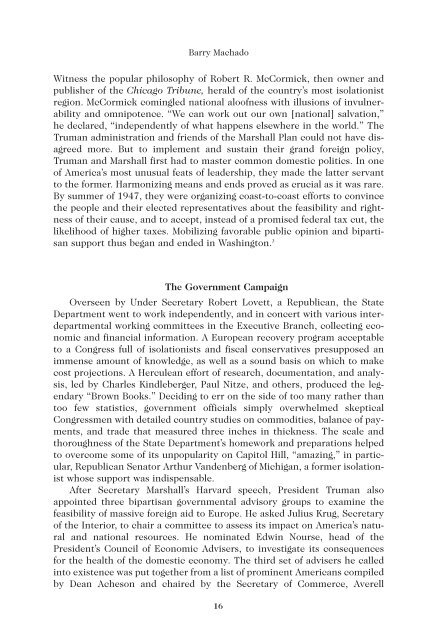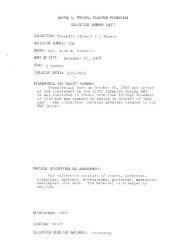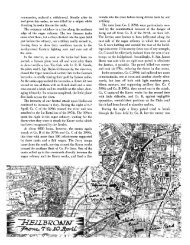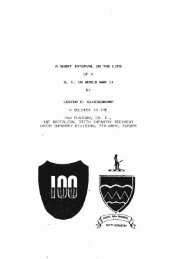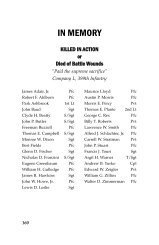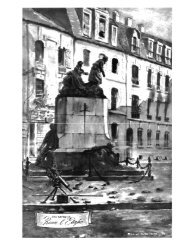Selling the Marshall Plan - The George C. Marshall Foundation
Selling the Marshall Plan - The George C. Marshall Foundation
Selling the Marshall Plan - The George C. Marshall Foundation
Create successful ePaper yourself
Turn your PDF publications into a flip-book with our unique Google optimized e-Paper software.
Barry Machado<br />
Witness <strong>the</strong> popular philosophy of Robert R. McCormick, <strong>the</strong>n owner and<br />
publisher of <strong>the</strong> Chicago Tribune, herald of <strong>the</strong> country’s most isolationist<br />
region. McCormick comingled national aloofness with illusions of invulnerability<br />
and omnipotence. “We can work out our own [national] salvation,”<br />
he declared, “independently of what happens elsewhere in <strong>the</strong> world.” <strong>The</strong><br />
Truman administration and friends of <strong>the</strong> <strong>Marshall</strong> <strong>Plan</strong> could not have disagreed<br />
more. But to implement and sustain <strong>the</strong>ir grand foreign policy,<br />
Truman and <strong>Marshall</strong> first had to master common domestic politics. In one<br />
of America’s most unusual feats of leadership, <strong>the</strong>y made <strong>the</strong> latter servant<br />
to <strong>the</strong> former. Harmonizing means and ends proved as crucial as it was rare.<br />
By summer of 1947, <strong>the</strong>y were organizing coast-to-coast efforts to convince<br />
<strong>the</strong> people and <strong>the</strong>ir elected representatives about <strong>the</strong> feasibility and rightness<br />
of <strong>the</strong>ir cause, and to accept, instead of a promised federal tax cut, <strong>the</strong><br />
likelihood of higher taxes. Mobilizing favorable public opinion and bipartisan<br />
support thus began and ended in Washington. 3<br />
<strong>The</strong> Government Campaign<br />
Overseen by Under Secretary Robert Lovett, a Republican, <strong>the</strong> State<br />
Department went to work independently, and in concert with various interdepartmental<br />
working committees in <strong>the</strong> Executive Branch, collecting economic<br />
and financial information. A European recovery program acceptable<br />
to a Congress full of isolationists and fiscal conservatives presupposed an<br />
immense amount of knowledge, as well as a sound basis on which to make<br />
cost projections. A Herculean effort of research, documentation, and analysis,<br />
led by Charles Kindleberger, Paul Nitze, and o<strong>the</strong>rs, produced <strong>the</strong> legendary<br />
“Brown Books.” Deciding to err on <strong>the</strong> side of too many ra<strong>the</strong>r than<br />
too few statistics, government officials simply overwhelmed skeptical<br />
Congressmen with detailed country studies on commodities, balance of payments,<br />
and trade that measured three inches in thickness. <strong>The</strong> scale and<br />
thoroughness of <strong>the</strong> State Department’s homework and preparations helped<br />
to overcome some of its unpopularity on Capitol Hill, “amazing,” in particular,<br />
Republican Senator Arthur Vandenberg of Michigan, a former isolationist<br />
whose support was indispensable.<br />
After Secretary <strong>Marshall</strong>’s Harvard speech, President Truman also<br />
appointed three bipartisan governmental advisory groups to examine <strong>the</strong><br />
feasibility of massive foreign aid to Europe. He asked Julius Krug, Secretary<br />
of <strong>the</strong> Interior, to chair a committee to assess its impact on America’s natural<br />
and national resources. He nominated Edwin Nourse, head of <strong>the</strong><br />
President’s Council of Economic Advisers, to investigate its consequences<br />
for <strong>the</strong> health of <strong>the</strong> domestic economy. <strong>The</strong> third set of advisers he called<br />
into existence was put toge<strong>the</strong>r from a list of prominent Americans compiled<br />
by Dean Acheson and chaired by <strong>the</strong> Secretary of Commerce, Averell<br />
16


